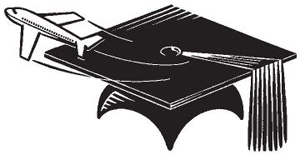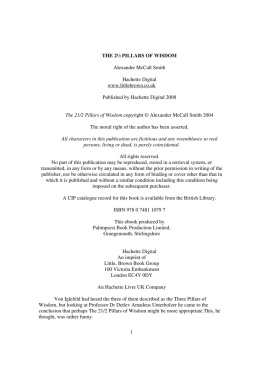

Table of Contents





This is for
MATTHEW GUREWITSCH

THE FINER POINTS OF SAUSAGE DOGS
PROFESSOR DR MORITZ-MARIA VON IGELFELD, author of that great triumph of Germanic scholarship, Portuguese Irregular Verbs, had never set foot on American shores. It is true that he had corresponded from time to time with a number of noted American philologists Professor Giles Reid of Cornell, for example, and Professor Paul Lafouche III of Tulane and it is also true that they had often pressed him to attend the annual meeting of the American Modern Languages Association, but he had never been in a position to accept. Or so von Igelfeld said; the reality was he had never wanted to go and had invariably come up with some excuse to turn down the invitations.
I have absolutely no interest in the New World, von Igelfeld said dismissively to Professor Dr Dr Florianus Prinzel. Is there anything there that we cant find in Germany? Anything at all? Can you name one thing?
Prinzel thought for a moment. Cowboys? He was a secret admirer of cowboy films but he could never mention this to von Igelfeld, who, as far as he knew, had never watched a film in his life, let alone one featuring cowboys. Prinzel rather liked the idea of America, and would have been delighted to be invited there, preferably to somewhere in the West.
Then, one morning, Prinzels invitation arrived and from no less an institution than the ideally situated University of San Antonio. This was a city redolent of cowboys and the Mexican border, and Prinzel immediately telephoned von Igelfeld to tell him the good news.
Von Igelfeld congratulated him warmly, but when he replaced the receiver his expression had hardened. It was quite unacceptable that Prinzel should go to America before he did. After all, the Americans might think that Prinzel, rather than he, von Igelfeld, represented German philology, and this, frankly, would never do. Quite apart from that, if Prinzel went first, they would never hear the end of it.
I have no alternative but to go there, he said to himself. And I shall have to make sure that I go before Prinzel. Its simply a matter of duty.
Von Igelfeld found himself in a difficult position. He could hardly approach any of his American friends and solicit an invitation, particularly after he had so consistently turned them down in the past. And yet the chance that an invitation would arrive of its own accord was extremely slender.
Over coffee at the Institute the next day, he directed a casual question at Professor Dr Detlev Amadeus Unterholzer.
Tell me, Herr Unterholzer, he said. If you were to want to go to America to give a lecture, how would you... well, how would you get yourself invited, so to speak? Quickly adding: Not that I would ever be in such a position myself, but you yourself could be, could you not?

Unterholzer had an immediate answer.
I should contact the Deutscher Akademischer Austauschdienst , he said. I should tell them who I was and I should ask them to arrange a lecture somewhere in America. That is what they are paid to do.
I see, said von Igelfeld. That would no doubt save embarrassment.
Of course, said Unterholzer. They are experts in finding places for German academics to go and lecture to other people, whether or not they want to hear them. They are very persuasive people. That is how I went to Buenos Aires and gave my lecture there. It really works.
And indeed it did. The local director of the DeutscherAkademischer Austauschdienst was delighted to hear from von Igelfeld the following day and assured him that a scholar of his eminence would be snapped up should he deign to leave Germany. It was only a question of finding the right institution and making the detailed arrangements.
Rest assured that you will be invited within days, von Igelfeld was promised. Just leave it all in our capable hands.
Thus von Igelfeld found himself arriving in Fayetteville, Arkansas, a charming college town nestling in the Ozark Mountains, seat of the University of Arkansas, or at least of that part not located in the minor campus at Little Rock. When the whole idea was conceived, he had not envisaged going to Arkansas. He had imagined that his destination might be California, or New York, perhaps, but one American state was very much the same as another at least in von Igelfelds view, and it really made no difference. The important thing was that he was going to America, and a good two weeks ahead of Prinzel.
Von Igelfelds hosts greeted him warmly. They had insisted that he stay with them, rather than in a hotel, and so von Igelfeld found himself installed in the sleeping porch of a traditional Ozark farmhouse on the edge of the town, the home of Professor R. B. Leflar. After he had unpacked, he and von Igelfeld sat down on the swing-seat on the front verandah and discussed his programme. There would be visits to the surrounding area the next day, promised Professor Leflar, and the day after that a set-piece lecture had been planned before an open audience.
That night, after dinner, von Igelfeld retired to his bed and looked out through the gauze-covered porch windows. The house was surrounded by mixed forest, oak trees and sycamores, and their shapes, dark silhouettes, swayed in the breeze. And there, he thought, theres the moon, rising slowly over the trees like a giant lantern. What were they planning for him tomorrow? Would they show him their libraries? Were there manuscripts? What about Leflars maternal grandfather, the adventurer, Charles Finger? He had been in South America and may have come across some Portuguese manuscripts of note, which could well be in the attic above his very head. Arkansas, it seemed, was rich in possibilities for the philologist.
The next morning he ate a hearty breakfast with Professor and Mrs Leflar before they set off.
Were heading north, said his host. Well show you a typical hog operation.
Most intriguing, said von Igelfeld. I am always interested in... He paused. What was he interested in? Philology? Portuguese verbs? I am always interested in everything.
They drove out of town, following a road that wound up into the hills. It was a gentle landscape limestone hills which had been softened by the action of the rain; meandering valleys dotted with farmhouses under shady oak trees. Von Igelfeld had not thought of America as being at all like this; there were no dry plains, no glittering Dallas in the distance, no leafy suburbia with neat white houses. This could have been Bavaria, or even Austria.
Next page
















